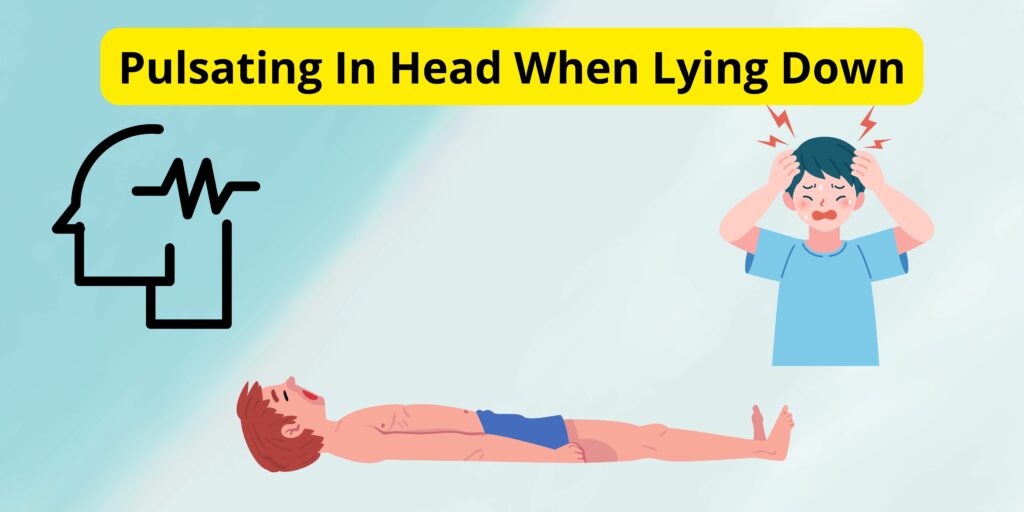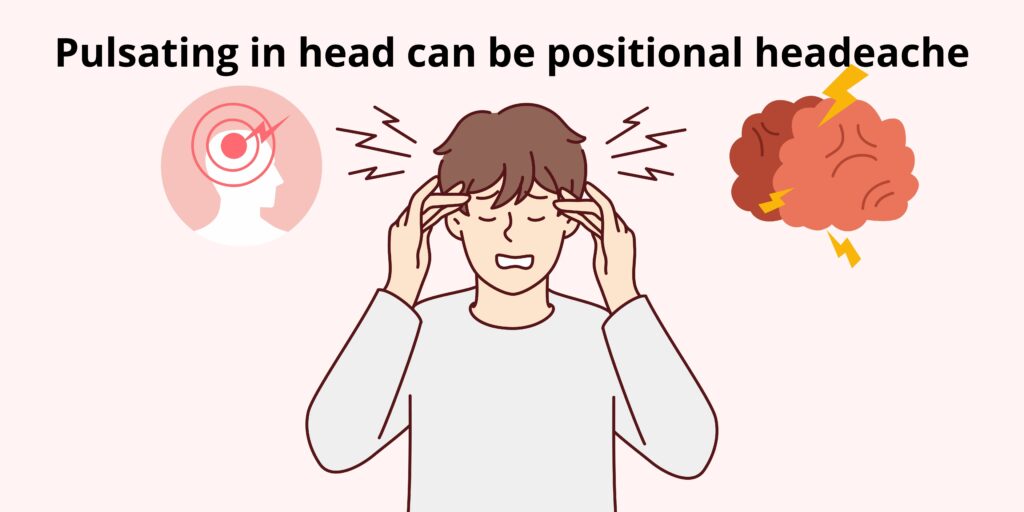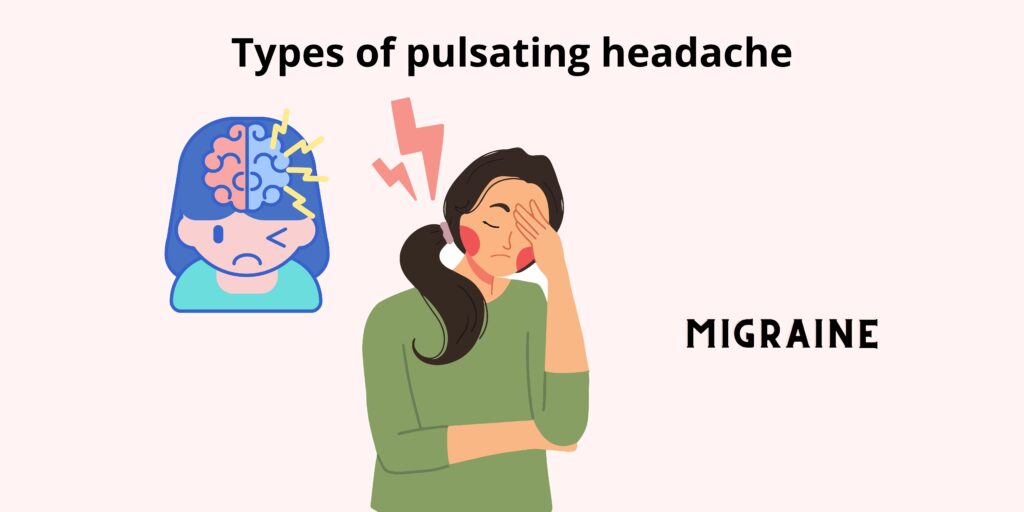
If you experience head pulsing when lying down, it can be a concerning and uncomfortable symptom. Pulsating in the head when lying down is often described as a feeling of rhythmic throbbing or pounding in the head. There can be many different causes of this symptom, and it’s important to identify the underlying cause to determine the most effective treatment plan.
- One of the most common causes of head pulsing when lying down is related to changes in blood flow. When you lie down, blood flow in the body can change, and this can affect the flow of blood to the brain. This can lead to a feeling of pulsing or throbbing in the head. Additionally, changes in blood pressure, such as low blood pressure or high blood pressure, can also contribute to this symptom.
- Another common cause of head pulsing when lying down is related to tension headaches. Tension headaches are often described as a feeling of pressure or tightness in the head and neck, and they can be triggered by stress, anxiety, or muscle tension. These headaches can cause a pulsing or throbbing sensation, particularly when lying down.
- Other potential causes of head pulsing when lying down include migraines, sinus headaches, and medical conditions that affect the blood vessels or nerves in the head. In some cases, medications or drug use can also contribute to this symptom.
Treatment for head pulsing when lying down depends on the underlying cause of the symptom. For example, if the symptom is related to tension headaches, stress reduction techniques, relaxation exercises, and over-the-counter pain medication may be effective. If the symptom is related to changes in blood flow or blood pressure, lifestyle changes and medication adjustments may be necessary.
In some cases, medical attention may be required if head pulsing when lying down is severe, persistent, or accompanied by other symptoms such as dizziness, nausea, or vision changes. In such cases, seeking medical advice is essential to identifying the underlying cause and developing an appropriate treatment plan.
In conclusion, head pulsing when lying down can be a concerning and uncomfortable symptom that can be caused by several different factors. Identifying the underlying cause is important to developing an effective treatment plan. If you experience this symptom, it’s important to speak with your healthcare provider to determine the underlying cause and appropriate treatment options.
Pulsating in head can be positional headeache

Head pulsing when lying down can be a sign of positional headache, a type of headache that occurs due to changes in head position. Positional headaches are typically characterized by a throbbing or pulsating sensation in the head that occurs when the head is in a certain position, such as lying down, standing up, or bending over.
1.Cerebrospinal fluid (CSF) pressure
The most common cause of positional headaches is related to changes in cerebrospinal fluid (CSF) pressure. CSF is a clear fluid that surrounds and protects the brain and spinal cord. Changes in CSF pressure can cause headaches that worsen when the head is in a certain position. In some cases, positional headaches can be caused by a CSF leak, which is a condition where CSF leaks out of the spinal canal and causes a headache.
2.Positional headaches
Positional headaches can also be caused by other medical conditions, such as brain tumors, infections, or inflammation. These conditions can cause headaches that are worsened by changes in head position.
3.Diagnosing positional headaches
Diagnosing positional headaches typically involves a thorough medical evaluation and diagnostic testing, such as a brain MRI, CT scan, or spinal tap. Treatment for positional headaches depends on the underlying cause of the headache. In some cases, over-the-counter pain medications or prescription medications may be used to manage symptoms. For positional headaches caused by a CSF leak, a blood patch may be necessary to seal the leak and relieve symptoms.
4.Preventing positional headaches
Preventing positional headaches involves avoiding activities or positions that trigger symptoms. For example, if lying down triggers a headache, sleeping with the head elevated or using a different sleep position may be helpful. Additionally, staying hydrated and practicing good posture can help prevent positional headaches.
In conclusion, head pulsing when lying down can be a symptom of positional headache, a type of headache that occurs due to changes in head position. Identifying the underlying cause of the headache is important to developing an effective treatment plan. If you experience positional headaches, it’s important to speak with your healthcare provider to determine the underlying cause and appropriate treatment options. By following your healthcare provider’s recommendations for managing symptoms and preventing future headaches, you can improve your overall quality of life.
Types of pulsating headache

Head pulsing when lying down can be a symptom of different types of pulsating headaches. Pulsating headaches are a type of headache that are characterized by a throbbing or pulsating sensation in the head. These headaches can be quite debilitating and interfere with daily activities. Understanding the different types of pulsating headaches can help with proper diagnosis and treatment.
- Migraine – One common type of pulsating headache is migraine. Migraines are a type of headache that typically occur on one side of the head and are characterized by a throbbing or pulsating sensation. Migraines can also cause sensitivity to light, sound, and smells, as well as nausea and vomiting. Migraines can be triggered by certain foods, stress, hormonal changes, and other factors.
- Tension headache– Another type of pulsating headache is tension headache. Tension headaches are the most common type of headache and are typically caused by muscle tension in the head and neck. Tension headaches are usually described as a dull, achy sensation that affects both sides of the head. They can also cause sensitivity to light and sound, as well as difficulty concentrating.
- Cluster headaches are another type of pulsating headache. Cluster headaches are characterized by severe, stabbing pain that occurs on one side of the head. Cluster headaches typically occur in cycles and can last for weeks or months at a time. They can also cause symptoms such as red or watery eyes, runny nose, and facial sweating.
- Sinus headaches are another type of headache that can cause head pulsing when lying down. Sinus headaches occur when the sinuses become inflamed or infected, causing pressure and pain in the face and head. Sinus headaches are typically accompanied by symptoms such as nasal congestion, runny nose, and facial pain.
In conclusion, head pulsing when lying down can be a symptom of different types of pulsating headaches. Migraines, tension headaches, cluster headaches, and sinus headaches are some of the most common types of pulsating headaches. If you experience head pulsing when lying down or other symptoms of a pulsating headache, it’s important to speak with your healthcare provider to determine the underlying cause and appropriate treatment options. By following your healthcare provider’s recommendations for managing symptoms and preventing future headaches, you can improve your overall quality of life.
FAQs
Head pulsing when lying down can be a concerning symptom, and you may have several questions about its causes and treatments. Here are some frequently asked questions about head pulsing when lying down:
- Q: Why does my head pulse when I lie down?
A: There can be many reasons for head pulsing when lying down, including migraines, tension headaches, cluster headaches, and sinus headaches. The exact cause will depend on the individual and their medical history.
- Q: When should I be concerned about head pulsing when lying down?
A: If your head pulsing when lying down is accompanied by other symptoms such as severe pain, nausea, vomiting, fever, or confusion, you should seek medical attention immediately. These symptoms may be a sign of a more serious underlying condition.
- Q: What are some treatments for head pulsing when lying down?
A: The treatment for head pulsing when lying down will depend on the underlying cause. For migraines and tension headaches, medications such as triptans and NSAIDs may be used to manage symptoms. For sinus headaches, decongestants and antibiotics may be prescribed. In some cases, lifestyle changes such as stress management techniques or dietary modifications may also be recommended.
- Q: Can head pulsing when lying down be prevented?
A: In some cases, lifestyle changes such as regular exercise, stress management techniques, and a healthy diet can help reduce the frequency and severity of pulsating headaches. It’s also important to identify and avoid any triggers that may be causing the headaches, such as certain foods or environmental factors.
- Q: Should I see a healthcare provider for head pulsing when lying down?
A: If your head pulsing when lying down is a new symptom, or if it is accompanied by other concerning symptoms, you should speak with a healthcare provider to determine the underlying cause and appropriate treatment options. Your healthcare provider can also help you develop a management plan to prevent future episodes of head pulsing when lying down.
In conclusion, head pulsing when lying down can be a symptom of several different types of headaches. If you experience this symptom, it’s important to speak with your healthcare provider to determine the underlying cause and appropriate treatment options. By managing your symptoms and making lifestyle changes as recommended by your healthcare provider, you can reduce the frequency and severity of head pulsing when lying down and improve your overall quality of life.
Conclusion
In conclusion, head pulsing when lying down can be a concerning symptom that can be indicative of various underlying medical conditions. If you experience this symptom, it’s important to speak with your healthcare provider to determine the underlying cause and appropriate treatment options.
As we have seen, there are several types of headaches that can cause head pulsing when lying down, including migraines, tension headaches, cluster headaches, and sinus headaches. The exact cause of head pulsing will depend on the individual and their medical history, and the treatment will vary accordingly.
In some cases, lifestyle changes such as regular exercise, stress management techniques, and a healthy diet can help reduce the frequency and severity of head pulsing when lying down. It’s also important to identify and avoid any triggers that may be causing the headaches, such as certain foods or environmental factors.
If your head pulsing when lying down is a new symptom, or if it is accompanied by other concerning symptoms such as severe pain, nausea, vomiting, fever, or confusion, you should seek medical attention immediately. These symptoms may be a sign of a more serious underlying condition.
By working with your healthcare provider and following their recommended treatment plan, you can manage your symptoms and reduce the impact of head pulsing when lying down on your daily life. With proper management and care, you can regain your comfort and well-being and continue living life to the fullest.